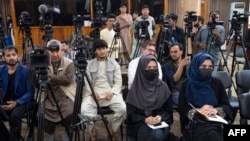Afghans wanting to access news online including via some of VOA's websites are being met with blank screens and error messages.
For at least two weeks, people in several provinces have reported problems when trying to access websites via their cellphones when using the networks of some privately owned telecoms carriers.
The websites affected are VOA's Pashto and Dari sites and the websites for Azadi Radio, which are run by VOA's sister network, Radio Free Europe/Radio Liberty. Other international public broadcasters, including the BBC, and VOA's English-language website appear to still be accessible.
Affected carriers include the privately owned telecommunication companies Afghan Wireless, Roshan, and Etisalat Afghanistan, which is a subsidiary of a United Arab Emirates-owned company.
The news sites were still accessible via Wi-Fi, or on the Salaam state internet provider, as well as when accessed via virtual private networks or VPNs, VOA found.
At least two people familiar with the situation told VOA they believe the block is the result of a Taliban order.
A source at one of the telecom providers — who asked not to be named for fear of retaliation — told VOA that the Taliban had ordered the company to block access to the websites.
A person familiar with the Afghan Media Violation Commission told VOA that the official body had not received an order to restrict the websites, but that it appeared the Taliban had acted on their own.
The person, who spoke on condition of anonymity, said, "It is clear that it is not a technical problem because the websites are closed on … major carriers. It is clear that it is [the Taliban's] work, but it has not been referred to the Commission."
A spokesperson for the Taliban did not respond to VOA's requests for comment.
A statement released on the Twitter feed of VOA's Acting Director Yolanda Lopez said the blocking of the network's websites "was not unexpected."
"We have prepared for it [and] our audience in Afghanistan has been using VOA-promoted tools to circumvent the blocking," the statement said.
The broadcaster is also transmitting via medium and shortwave radio after the Taliban in late 2022 blocked its FM broadcasts.
"Despite the efforts of the Taliban to censor us, VOA will continue to serve the people of Afghanistan with accurate information," the VOA statement said.
The unidentified person with knowledge of the media commission's work noted that the Taliban had previously ordered FM broadcasts for VOA and RFE/RL to be stopped and separately had ordered the blocking of the news websites Hasht-e Subh and Zawia Media.
The Taliban made threats against at least one of those outlets before the later order to have it blocked.
Abdul Khalil Rasoli, a journalist who used to work for Hasht-e Subh in Herat and Kabul, told VOA last year the newspaper had received "direct threats from Taliban" after it reported in late 2021 on meetings between the Taliban acting interior minister and families of suicide bombers.
"They [the Taliban] threatened our media outlets [and journalists], including me, telling us, 'If you are going to continue publishing such news and using terms, such as suicide attacker, we will let our Mujahideen do whatever they want with you. And we will not guarantee your security,'" said Rasoli.
"After that, in an online meeting [of the media outlet], it was decided to gradually close the outlet and take a moderate approach to cover news so that our colleagues, particularly those colleagues who were well known and at risk, get out of Afghanistan," he added.
Rasoli left Afghanistan with his family in 2022.
The Taliban return to power has had a negative impact on media in the country, says the watchdog Reporters Without Borders. Within the first three months of their takeover in 2021, 43% of the country's media outlets shuttered, and 84% of female journalists have been forced to leave their jobs.
VOA's Afghan division contributed to this report.








